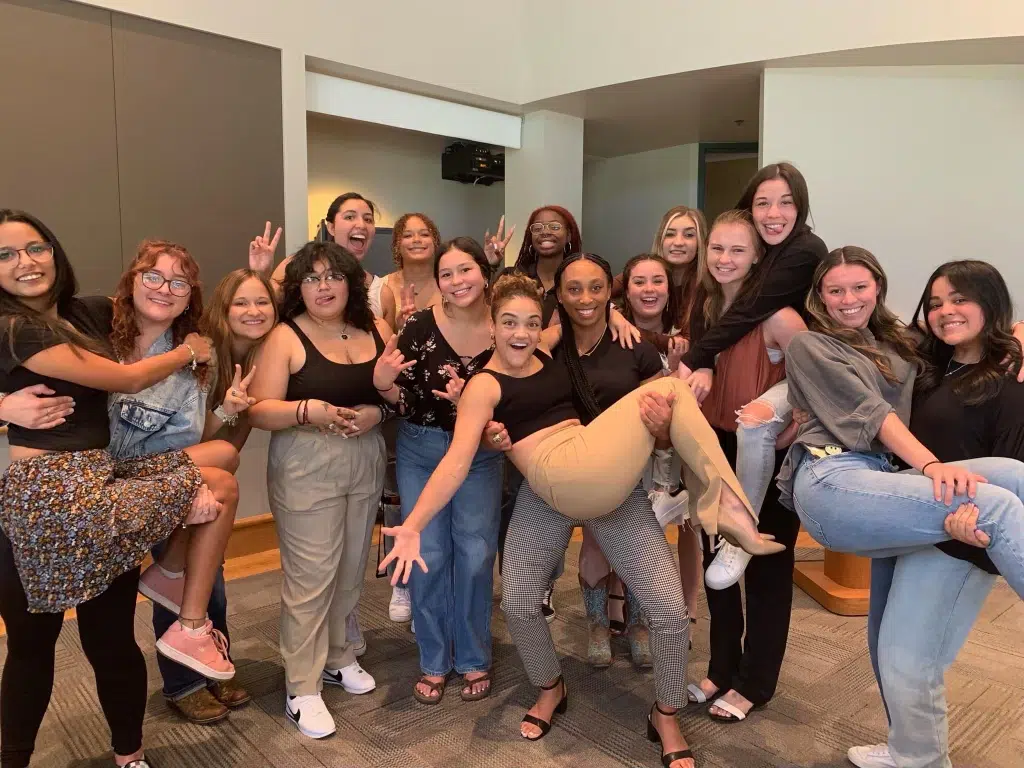(Seguin) — Unfortunately for many of us, when it comes to mental health, it’s the thing that is often put on the back burner. Whether it’s the stigma behind getting help or the idea that there is not a problem – most people often go at it alone thinking only they suffer from such pain as anxiety or depression.
Opening up her own experience on the issue is none other than U.S. Olympic gold medalist Laurie Hernandez. Hernandez as a teen was a member of the U.S. women’s gymnastics team dubbed “The Final Five” during the 2016 Summer Olympics.
Today, Hernandez travels the nation sharing a message of mental health and the importance of getting help.
“My mom is a social worker. My sister is a therapist. I have seen countless therapists and sports psychologists just in general. I think mental health deserves to be talked about. I do believe that even though we have come a long way, there is a huge stigma that surrounds it and also like burnout culture for me specifically is a piece that I have experienced time and time again and you don’t have to be a professional athlete to experience burnout. It’s in college. It’s in jobs and occupations. It is everywhere and so encouraging people to take a break — someone who has experienced that over and over and then starting to experience — like okay, I have a boundary. I’m going to take a break. I’m going to rest. I’m going to do X, Y and Z so I can feel better tomorrow. I think that’s really important,” said Hernandez.
Hernandez who spoke this past week at Texas Lutheran University as part of Hispanic Heritage Month, says her message comes directly from her own personal journey.
“I’ve had my own mental health journey. I have been very open about depression, anxiety, panic attacks, different things like that and again, kind of just looking back, making sure that this stigma gets pulled because people are still afraid to come forward and say ‘hey, I need help. I need assistance. I need support,’ and I just want to make sure that you don’t have to have any shame in that. If anything, it makes you stronger. Vulnerability is power and expressing that vulnerability is really something else,” said Hernandez.
Hernandez says the help that exist, however, is not always a quick fix nor is it the same for everyone.
“I think in my own experience, I had spoken with a sports psychologist before 2016 and I worked with this person because I was getting like massive panic attacks before performances like crying, shaking, and also would salute the judges and go up and I would train all these perfect routines and then I would fall two or three times and it was like just I was the kid who couldn’t really be counted on. I was inconsistent and that reputation gave me more anxiety so it was just this awful snowball so I ended up doing EMDR (Eye Movement Desensitization and Reprocessing Therapy). It’s like the light therapy. I don’t exactly know how it works but it worked for me and I’m so glad that we had that resource because then I would start going out and competing. I learned how important self talk is and it’s like okay, you are here, acknowledge that you are anxious. It’s a thing. You are not going to be not anxious. So be anxious and understand that you are brave enough to do it anyways. It’s like, you’ve trained for this. Self-talk is so important and I think without having that, I don’t think my career would have went the way that it did because most of sports is psychological. It’s mental and then post-sports, taking a break from gymnastics after 2016, my life had done a complete 180,” said Hernandez.
Yet, Hernandez says no matter what road a person chooses, seeking help is that first step toward reclaiming their life.
“Am I taking time to self-care and like take a bath and meditate? I tried all of these things and I still felt like everyday I was waking up with anchors on my feet — like everything was so sluggish. I felt like I did everything possible and my sister said maybe, it’s time to try something new. We waited for so long. We talked about anti-depressants. You’ve danced around it as if it was taboo. It was like maybe it’s time to try it and so I remember trying one the first two weeks. It definitely helped but I didn’t like the way it made me feel so we switched to something else and it is was like my life completely changed. I like walked into my apartment and was like ‘oh man, it’s messy in here’ so I started cleaning things and I woke up the next morning and looked at my place and it was clean and beautiful and I was like ‘oh my God,’ for the first time, I feel like I woke up. I felt like I was present. I don’t remember having to talk myself into starting the day and getting out of bed. I just did it and it was mind-blowing and so that at the time is what I needed,” said Hernandez.
During her visit, Hernandez also spoke about body shaming – a term she knew quite well having been a gymnast since the age of 5. Hernandez says it’s important to be okay with one’s body and to avoid the ignorance that others might say or illustrate whether it be on TV or social media. Hernandez who is now 22 and studying acting at NYU, says her vision for life is simple.
She says it’s to surround yourself with positivity and the quest to always do what is best for you.





